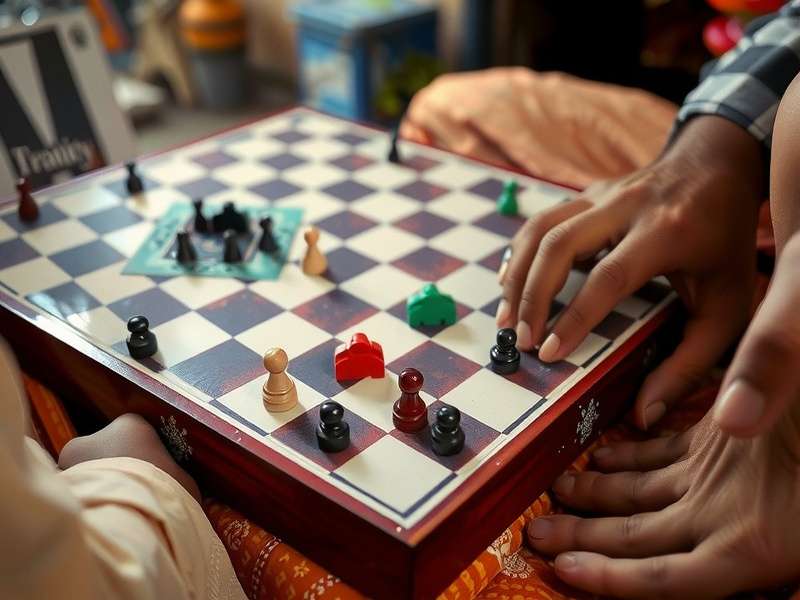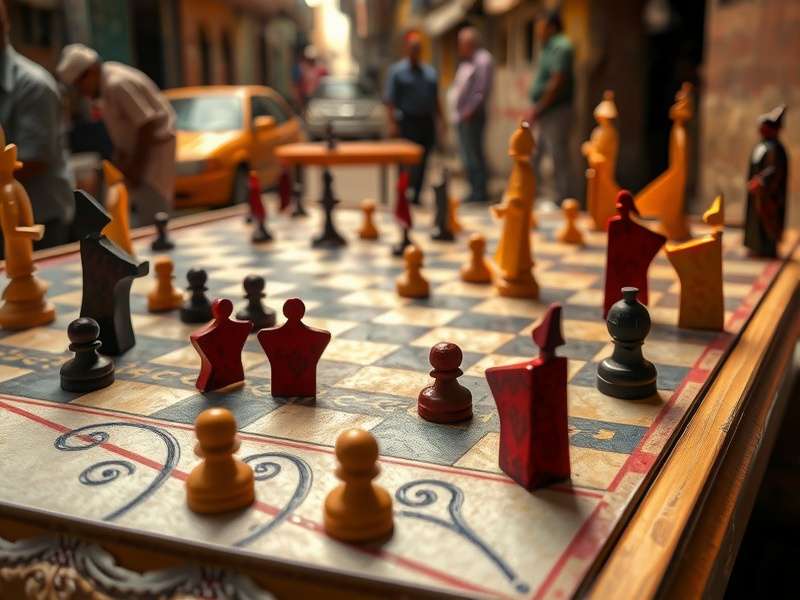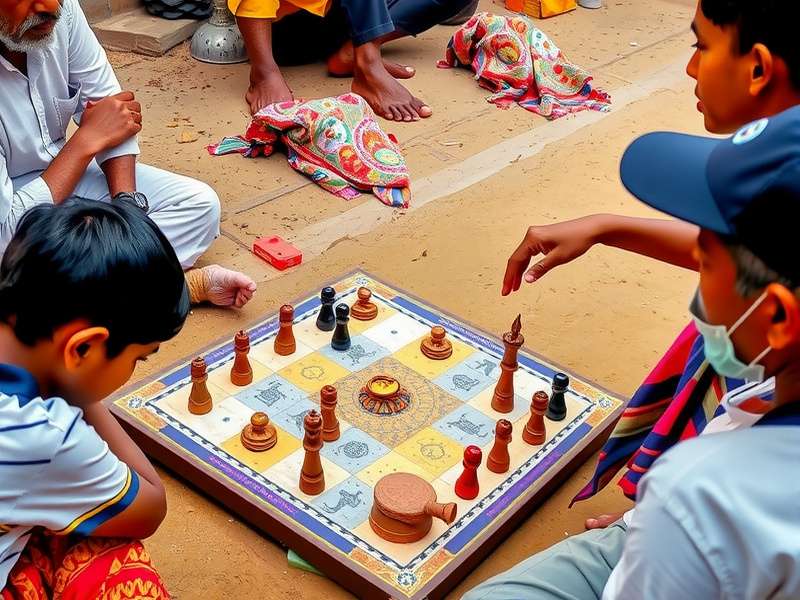What Are Chowk Crushers? 🤔
Chowk Crushersis a traditional Indian street game that combines elements of strategy, skill, and chance. Played primarily in rural and urban neighborhoods across India, this game has been a staple of childhood for generations of Indians.
The name "Chowk Crushers" derives from the Hindi word "Chowk" meaning intersection or square, and "Crushers" referring to the decisive moves that can crush an opponent's strategy. This game is typically played on a grid drawn on the ground, using stones, seeds, or handmade pieces as tokens.
Key Insight:Unlike many modern games, Chowk Crushers requires no specialized equipment, making it accessible to children from all socioeconomic backgrounds. This accessibility has contributed significantly to its enduring popularity across India.


The game's simplicity belies its strategic depth.Chowk Crushershas been compared to Western games like Checkers or Mancala, but with unique Indian twists that reflect local cultural values and social dynamics.
Historical Origins & Evolution 📜
The exact origins of Chowk Crushers are lost to history, but oral traditions suggest it dates back several centuries. Folk tales from Rajasthan describe similar games being played in royal courts, while variations have been documented across different regions of India.
Historical records from the Mughal era contain references to games resemblingChowk Crushers, suggesting it may have evolved from Persian board games that were adapted to local Indian contexts. The game's grid-based structure shares similarities with ancient Indian war strategies.
Regional Variations
Across India's diverse cultural landscape, Chowk Crushers has developed numerous regional variations:
North Indian Style
Characterized by a 5x5 grid and emphasis on aggressive "crushing" maneuvers. Popular in states like Uttar Pradesh and Bihar.
South Indian Adaptation
Features a more complex 7x7 grid and incorporates elements of local traditional games. Prevalent in Tamil Nadu and Karnataka.
Coastal Variations
In coastal regions, the game sometimes incorporates shells instead of stones, reflecting local available materials.
Throughout the 20th century,Chowk Crushersremained a popular pastime despite the introduction of Western games. Its resilience speaks to its deep cultural roots and the genuine enjoyment it provides players of all ages.
Game Rules & Mechanics 🎮
Understanding the rules of Chowk Crushers is essential to appreciating its strategic depth. While variations exist, the core rules remain consistent across most versions of the game.
Basic Setup
The game is typically played on a grid drawn on the ground - usually 5x5 or 7x7 squares. Each player has an equal number of pieces (usually 12-16), which are placed on opposite sides of the board. The objective is to capture all of your opponent's pieces or block them from making legal moves.
Movement Rules
Pieces move diagonally forward, similar to checkers. However, inChowk Crushers, there are special "crusher" moves that allow pieces to move in unique patterns when certain conditions are met. These crusher moves are the game's namesake and can dramatically shift the balance of power.
Pro Tip:Mastering the crusher moves is key to becoming an expert Chowk Crushers player. These moves require precise positioning and foresight.
Capturing Mechanics
Pieces are captured by jumping over them, but unlike Western checkers, multiple captures in a single turn are not only possible but encouraged. The most skilled players can set up elaborate chain reactions that capture multiple opponent pieces in one spectacular move.

Special rules govern when a piece becomes a "Crusher" - a powered-up version that can move differently and has enhanced capturing abilities. Achieving Crusher status is often the turning point in competitive matches of Chowk Crushers.
Advanced Strategies & Tactics 🧠
While Chowk Crushers appears simple at first glance, high-level play requires sophisticated strategic thinking. Experienced players employ various tactics that have been refined over generations.
Opening Strategies
The initial moves in Chowk Crushers set the tone for the entire game. Conservative openings focus on building a strong defensive formation, while aggressive openings aim to control the center of the board quickly. Regional preferences often influence opening choices.
Mid-Game Tactics
Once pieces are developed, the game enters a complex phase where positioning becomes crucial. Key tactics include:
- The Pincer Movement:Coordinating multiple pieces to trap opponent tokens
- Sacrifice Plays:Deliberately losing a piece to gain positional advantage
- Crusher Baiting:Luring opponents into positions where your pieces can achieve Crusher status
Expert Insight:The most successful Chowk Crushers players think several moves ahead, anticipating not just their own strategy but also their opponent's likely responses.
Endgame Techniques
When only a few pieces remain, precise calculation becomes essential. Endgames often revolve around forcing your opponent into positions where they must make disadvantageous moves. Understanding basic endgame patterns separates casual players from serious competitors.
MasteringChowk Crushersrequires both tactical sharpness and strategic patience. The best players balance aggressive capturing with careful position building, adapting their style to counter their specific opponent's approach.
Cultural Significance & Modern Relevance 🌍
Chowk Crushers is more than just a game - it's a cultural artifact that reflects Indian social values, community dynamics, and traditional ways of thinking. Its continued popularity offers insights into Indian childhood and social interaction.
Social Functions
Traditionally, Chowk Crushers served as a social leveler - a game where children from different backgrounds could compete on equal terms. The game's minimal equipment requirements meant that economic disparities were less relevant than skill and strategy.
In many communities, Chowk Crushers tournaments became important social events, bringing together neighbors and strengthening community bonds. Elder players would often mentor younger ones, passing down strategies and variations through oral tradition.
Educational Value
Educators have noted that playing Chowk Crushers develops valuable cognitive skills:
Strategic Thinking
Players learn to plan ahead and consider multiple possibilities
Mathematical Skills
The game inherently teaches counting, patterns, and probability
Social Intelligence
Players learn to read opponents and adapt strategies accordingly
Cultural Connection
The game connects players to Indian traditions and heritage
Modern Revival
In recent years, there has been a renewed interest in traditional Indian games likeChowk Crushers. Cultural organizations, schools, and community groups have begun promoting these games as alternatives to digital entertainment, recognizing their social and cognitive benefits.
Some urban areas have seen the emergence of Chowk Crushers clubs and tournaments, while digital versions are being developed to introduce the game to new generations. This revival represents a fascinating intersection of tradition and modernity in contemporary Indian culture.
Cultural Insight:The enduring appeal of Chowk Crushers demonstrates how traditional games can adapt to changing times while preserving their core identity and values.
As India continues to modernize, games like Chowk Crushers serve as important cultural touchstones - connecting urban youth with rural traditions and providing a sense of continuity in a rapidly changing society. The future of Chowk Crushers looks bright as new generations discover the joy and challenge of this classic Indian game.
Competitive Scene & Tournaments 🏆
While traditionally a casual street game, Chowk Crushers has developed a competitive scene in certain regions. Local tournaments often draw significant crowds, with players demonstrating astonishing skill and creativity.
These competitions follow standardized rules to ensure fair play, while still allowing for regional variations in special tournaments. The most prestigious Chowk Crushers championship takes place annually in Rajasthan, attracting top players from across India.
Notable Players
Over the years, certain individuals have gained renown for their mastery of Chowk Crushers. These players are often celebrated in their communities and sometimes even achieve minor celebrity status for their game prowess.
What's remarkable about Chowk Crushers champions is that they come from diverse backgrounds - from rural villages to metropolitan cities, proving that talent for this game knows no social or economic boundaries.
Psychological Dimensions 🧠
The mental aspects of Chowk Crushers are as important as the strategic ones. Successful players develop keen psychological insight, learning to read opponents' intentions and conceal their own strategies.
Bluffing, misdirection, and pattern disruption are all psychological tools employed by expert Chowk Crushers players. The game becomes not just a battle of moves but a contest of minds, with each player trying to outthink the other.
Flow State & Concentration
Many players describe entering a "flow state" during intense matches of Chowk Crushers, where they become completely absorbed in the game, losing track of time and external distractions. This mental absorption is one of the game's most rewarding aspects.
The concentration required for high-level play has been noted by cognitive scientists, who see parallels between the focused attention in Chowk Crushers and meditation practices. This may explain why the game is both relaxing and mentally stimulating.
Global Potential & Future Directions 🌐
As the world becomes more interested in diverse cultural traditions, Chowk Crushers has potential for international appeal. Its simple rules but deep strategy make it accessible yet challenging for players worldwide.
Some game designers have proposed creating hybrid versions that blend Chowk Crushers with elements from other traditional games, creating new experiences that honor multiple cultural heritages. Such innovations could help introduce Chowk Crushers to global audiences.
Digital Adaptations
Mobile and online versions of Chowk Crushers are in development, which could make the game accessible to Indians living abroad and international enthusiasts. These digital platforms could also facilitate international tournaments and cultural exchange.
However, purists argue that the physical, social aspect of Chowk Crushers is integral to its appeal. The future likely holds a balance - digital versions for accessibility and convenience, alongside continued traditional play for authentic cultural experience.
As we look to the future,Chowk Crushersstands as a testament to the enduring power of traditional games in a digital age. Its blend of simple mechanics and deep strategy, combined with its rich cultural heritage, ensures that it will continue to be played and cherished for generations to come.